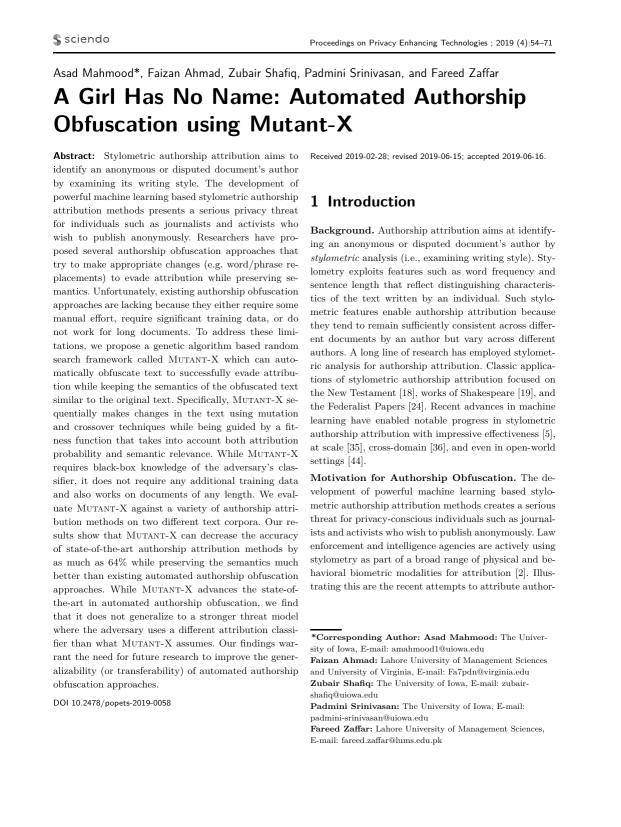A Girl Has No Name: Automated Authorship Obfuscation using Mutant-X
Authors: Asad Mahmood (The University of Iowa), Faizan Ahmad (Lahore University of Management Sciences and University of Virginia), Zubair Shafiq (The University of Iowa), Padmini Srinivasan (The University of Iowa), Fareed Zaffar (Lahore University of Management Sciences)
Volume: 2019
Issue: 4
Pages: 54–71
DOI: https://doi.org/10.2478/popets-2019-0058
Abstract: Stylometric authorship attribution aims to identify an anonymous or disputed document’s author by examining its writing style. The development of powerful machine learning based stylometric authorship attribution methods presents a serious privacy threat for individuals such as journalists and activists who wish to publish anonymously. Researchers have proposed several authorship obfuscation approaches that try to make appropriate changes (e.g. word/phrase replacements) to evade attribution while preserving semantics. Unfortunately, existing authorship obfuscation approaches are lacking because they either require some manual effort, require significant training data, or do not work for long documents. To address these limitations, we propose a genetic algorithm based random search framework called Mutant-X which can automatically obfuscate text to successfully evade attribution while keeping the semantics of the obfuscated text similar to the original text. Specifically, Mutant-X sequentially makes changes in the text using mutation and crossover techniques while being guided by a fitness function that takes into account both attribution probability and semantic relevance. While Mutant-X requires black-box knowledge of the adversary’s classifier, it does not require any additional training data and also works on documents of any length. We evaluate Mutant-X against a variety of authorship attribution methods on two different text corpora. Our results show that Mutant-X can decrease the accuracy of state-of-the-art authorship attribution methods by as much as 64% while preserving the semantics much better than existing automated authorship obfuscation approaches. While Mutant-X advances the state-ofthe-art in automated authorship obfuscation, we find that it does not generalize to a stronger threat model where the adversary uses a different attribution classifier than what Mutant-X assumes. Our findings warrant the need for future research to improve the generalizability (or transferability) of automated authorship obfuscation approaches.
Copyright in PoPETs articles are held by their authors. This article is published under a Creative Commons Attribution-NonCommercial-NoDerivs 3.0 license.

